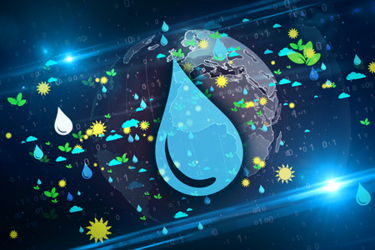SWAN Corner: Combating Climate Change With AI-Driven Smart Water Solutions
By Mahesh Lunani and Jonathan Hasson

As climate change continues to intensify, utilities face a growing list of challenges from unpredictable storm events and aging infrastructure to rising energy demands and water scarcity. These evolving external pressures are forcing utility leaders to reimagine infrastructure and operations, adopt resilient systems, and pursue sustainable practices grounded in data.
Over the past decade, Aquasight has worked alongside more than 120 utilities across the U.S. to deploy a suite of digital water platforms tailored to these realities. Through thoughtful collaboration and real-world deployments, Aquasight’s solutions ACE™, AURA™, ATLAS™, APOLLO™, and AMP™ are helping communities translate climate impacts into operational action.
Here’s how some of those stories are unfolding on the ground.
Turning Data Into Action In Stormwater Management
In Macomb County, Michigan, the increasing frequency and intensity of rainstorms created mounting stress on the sewer system, often overwhelming infrastructure and increasing flood risks. Rather than reacting after the fact, county officials turned to Aquasight’s ACE, specifically its Rain Heatmaps and Storm Catalog, to proactively manage wet weather events.
By integrating real-time rainfall data with flow monitoring and historic storm records, the county gained a clear view of where and when the system was under duress. This allowed field teams to better prioritize response efforts, deploy crews more efficiently, and make data-backed infrastructure planning decisions. It’s a compelling example of how communities can enhance climate resilience through dynamic, spatially, and temporally aware intelligence.
Managing CSOs with Automation And Transparency
Combined sewer overflows (CSOs) present one of the more visible — and problematic — climate risks in aging urban systems. In Boston, where intense storms can trigger sewer overflows into local waterways, the Boston Water and Sewer Commission sought a smarter way to monitor, report, and reduce CSO incidents.
They implemented a purpose-built ACE module workflow, spanning CSO detection through to public notification. With real-time insights, automated alerts, and streamlined reporting, the city now has a more transparent, efficient, and compliant system. The public is better informed, regulatory requirements are more easily met, and trust in utility operations has grown.
This project is one of several where Aquasight has collaborated closely with utilities to bridge operational gaps through practical, automated solutions.
Saving Water One Drop At A Time
Even regions surrounded by freshwater are not immune to the growing threat of water scarcity. Great Lakes Water Authority (GLWA), serving over 4 million residents in Southeast Michigan, recognized that sustainable water management required a more complete understanding of distribution system performance.
GLWA adopted Aquasight’s AURA platform to achieve real-time, “source-to-tap” visibility. The platform’s ability to track demands, monitor pressure fluctuations, and provide early warnings on water quality enabled the utility and its member partners not only to gain visibility but also to optimize their systems. This project reflects a broader trend: digital solutions are no longer optional; they’re essential to meeting long-term sustainability goals.
Driving Efficiency And Workforce Transformation
In Haverhill, Massachusetts, the city’s wastewater treatment plant faced the complex challenge of optimizing operations across a facility with peak flows of up to 65 MGD. By implementing Aquasight’s APOLLO platform, the city quantified significant operational and cost efficiencies: cutting energy costs by 15.7%, chemical usage by 7.8%, and trucking costs by nearly 4%. The platform integrated real-time data, AI-driven insights, and predictive analytics to optimize influent pumping, aeration, RAS operations, and dewatering processes.
Beyond the impressive savings (605,000 kWh in annual energy and $185,000 in recurring cost reductions), APOLLO also played a pivotal role in transforming the utility’s workforce. Operators now rely on the platform’s intelligent guidance to make more informed decisions, retain institutional knowledge, and train new staff with a digitally enhanced mindset. As Robert Ward, Director of Public Works, noted, having real-time analytics “beyond what SCADA gives us is a game-changer.” This case exemplifies how AI and digital platforms can simultaneously boost performance and empower the people behind the process.
Energy Optimization As A Climate Strategy
Water utilities are among the most energy-intensive sectors in local government, and as sustainability targets become more aggressive, energy use is under scrutiny. In Grand Rapids, Michigan, the city’s sustainability goals included reducing energy use in water operations by a meaningful margin.
With support from Aquasight’s ATLAS platform, the city implemented streaming analytics and forecast demand models to have visibility on energy consumption across a complex rate structure and high service pumping operation. A savings potential of up to 44% was identified during peak periods. These improvements not only offered an opportunity to lower operating costs but also helped reduce the city’s carbon footprint.
Digital platforms like ATLAS are increasingly being used not only for cost savings, but also as strategic tools in the broader fight against climate change.
Scaling Innovation Without Losing Sight Of Reality
Each of these case studies shows a different climate challenge, but the through-line is clear: utilities are increasingly turning to digital partners who understand not only how to manage O&M data, AI, and technology, but also the unique operational realities of water and wastewater systems.
Aquasight’s platforms are built with those realities in mind. From the beginning, the company has focused on building digital solutions that is intuitive, impactful, and scalable. Designed not for “future state” aspirations, but for the decisions utilities must make today.
As a U.S.-based company born out of collaboration with public agencies, Aquasight takes pride in delivering more than just platforms. It delivers partnerships, and those partnerships are proving to be vital in preparing for the unpredictable years ahead.
Looking Forward
While the tools and technologies are evolving, the mission remains clear: help utilities do more with less, operate smarter under pressure, and remain resilient in the face of climate uncertainty.
For utility leaders, the path forward is no longer just about compliance or performance, it’s about foresight, adaptability, and commitment to the communities they serve.
With scalable solutions, collaborative expertise, and a deep commitment to impact, Aquasight continues to support utilities on that path, helping them not just navigate climate change, but shape what comes next.
 Mahesh Lunani is the founder and CEO of Aquasight, where he leads the company’s mission to transform the water lifecycle through real-time artificial intelligence and digital insight. Under his leadership, Aquasight has grown into a nationally recognized water intelligence company serving major cities and utilities across the U.S. With two decades of experience in senior leadership roles at Cognizant, IBM, Roland Berger, and Ford Motor Company, Mahesh has consistently driven strategy, digital innovation, and growth. His passion for applying data and AI to infrastructure challenges led him to create one of the first end-to-end, real-time water intelligence platforms, covering sewer flow forecasting, energy and chemical optimization, predictive maintenance, and water quality management. He is also the creator and host of the 21st Century Water podcast, where he engages with industry leaders on the bold ideas shaping the future of water.
Mahesh Lunani is the founder and CEO of Aquasight, where he leads the company’s mission to transform the water lifecycle through real-time artificial intelligence and digital insight. Under his leadership, Aquasight has grown into a nationally recognized water intelligence company serving major cities and utilities across the U.S. With two decades of experience in senior leadership roles at Cognizant, IBM, Roland Berger, and Ford Motor Company, Mahesh has consistently driven strategy, digital innovation, and growth. His passion for applying data and AI to infrastructure challenges led him to create one of the first end-to-end, real-time water intelligence platforms, covering sewer flow forecasting, energy and chemical optimization, predictive maintenance, and water quality management. He is also the creator and host of the 21st Century Water podcast, where he engages with industry leaders on the bold ideas shaping the future of water.
 Jonathan Hasson, Vice President of Smart Water Solutions at Aquasight, is a seasoned engineering executive with over 30 years of leadership in the water and wastewater sector. With a strong foundation in civil and environmental engineering, he has directed complex projects involving potable water systems, treatment facilities, stormwater management, and wet weather strategies across both domestic and international markets. A Registered Professional Engineer in multiple states, Jonathan blends deep technical expertise with business and product acumen to drive solutions from concept to market. He is passionate about tackling climate-resilient infrastructure challenges through actionable data intelligence, and his leadership plays a key role in transforming emerging utility needs into scalable, sustainable solutions that improve operational visibility and community resilience.
Jonathan Hasson, Vice President of Smart Water Solutions at Aquasight, is a seasoned engineering executive with over 30 years of leadership in the water and wastewater sector. With a strong foundation in civil and environmental engineering, he has directed complex projects involving potable water systems, treatment facilities, stormwater management, and wet weather strategies across both domestic and international markets. A Registered Professional Engineer in multiple states, Jonathan blends deep technical expertise with business and product acumen to drive solutions from concept to market. He is passionate about tackling climate-resilient infrastructure challenges through actionable data intelligence, and his leadership plays a key role in transforming emerging utility needs into scalable, sustainable solutions that improve operational visibility and community resilience.
SWAN, the Smart Water Networks Forum (SWAN), is the leading global hub for the smart water sector. A UK-based non-profit, SWAN brings together leading international water utilities, solution providers, academics, investors, regulators, and other industry experts to accelerate the awareness and adoption of “smart,” data-driven solutions in water and wastewater networks worldwide. Learn more at www.swan-forum.com.
